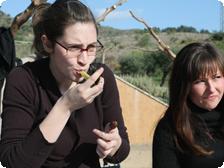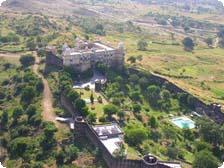by Rachel Ward
“Esta es la Cataluña profunda,” quipped Juanjo—the tall and dark cinematographer boyfriend of my language partner Laia—referring to our remote location, deep in the wine and olive country of the Spanish province that borders France, called Catalunya in Catalan. I suffered waves of nausea from the backseat as our car curved deeper into the valley, spiraling down mountains capped with craggy, protruding rock formations.
We’d driven two hours outside of Barcelona—far off the tourist map. My new friend Laia had invited me to a calçotada—a popular Catalan end-of-winter feast based on the en masse consumption of barbecued calçots, an elongated plant comparable to the green onion.
I had moved to Barcelona on my own nearly five months prior with the goal of improving my Spanish language skills and to experience life in a cosmopolitan European city. However my efforts at building my fluency in the language and establishing a local circle of friends had been agonizingly unproductive. I spoke only English in my isolating job as an au pair for a three year-old and a five year-old, and my casual morning language class lacked much of a conversational component. Further stunting my efforts was the fact that Spanish (called Castellano in Spain) isn’t even the main language spoken in Catalonia, the province of Spain where Barcelona is the capital. Instead most residents speak Catalan, one of Spain’s four co-official languages.
Despite the beauty of the The Serra de Collserola mountains along the Mediterranean, my appreciation of Gaudi’s genius and Zara’s bargains, at times I found reading a menu or logging onto a library computer in Barcelona frustrating enough to second guess my move. I developed an annoyance toward Catalan and made little effort to pick it up. Why would I want to waste my months in Spain learning—what I erroneously considered—a relatively obscure language, when I still hadn’t achieved my long-time goal of mastering (arguably) the world’s second most widely used tongue, spoken by 350 million?
Instead I laboriously attempted to set up English-Spanish language exchanges with locals. After several Internet ads and forum postings that only seemed to attract a suspicious number of pudgy, balding males in their 40s, I finally got a promising response: a 26-year-old engineer named Laia, who wanted to build on the English she had learned during a recent, six-month stint in New York City.
About 10 minutes into our first coffee date at an outdoor table on the elegant avenue Passeig de Gràcia, Laia made it clear that she considered herself Catalan, rather than Spanish. In fact the tall, brown-eyed blonde with cat-eye glasses even mentioned her staunch support for Catalonia’s independence from Spain. In between cigarette puffs she joked that her Castellano had improved in the three years she’d spent with her Spanish boyfriend.
Despite generalizations of Catalans as socially reserved and even stingy—which Laia herself good-naturedly confirmed—she invited me to dinner in her tiny, arty apartment in the residential l’Eixample district to watch a Barça soccer match. A few weeks later, we were on our way to a village near the Spanish-Roman city of Tarragona to meet a group of her friends for an unequivocally Catalan tradition.
Questioning the reliability of our GPS, we pulled over at a village—if that’s what you could call the short strip of buildings against a hillside. Laia jumped out of the car to ask directions.
“They only answer to Catalan here,” she explained to me.
When we finally made it to La Vilella Baixa—Catalan for “low valley”—I felt as though we were walking through the pages of a photo spread in a travel magazine. Set deep in the surrounding mountains, the sandstone settlement jutted from a rocky hill in the valley, with some houses built eight-stories high due to the steep slope. The nearly vertical streets—deserted since we had arrived during the daily siesta—led to a picturesque cathedral tower. The Catalan flag waved high.
“Es realmente surrealista,” commented Juanjo as he squinted through the lens of his camera.
As the only foreigner, I felt nervous approaching the Catalan-speaking group gathered on the edge of the town in a public picnic site hanging over a vineyard. Laia suggested that I stick near Juanjo—the only other non-Catalan—for Castellano conversation. Indeed—with his regal nose, thick hair and beard—he looked like the prototype of a Spaniard.
Meanwhile, a team piled vines on the steel barbecues to be used for kindle. Laia told me they had been assembling hundreds of bundles of freshly pulled, still-grubby calçots since 7 a.m. A man with a blond ponytail dumped a load of kindle on the embers and wiped his forehead with the sleeve of his T-shirt. The fire cracked and vine smoke clouded the air, filling my nostrils and reddening my eyes.
Nearby, big yellow dogs bounded after sticks as one mother scooted her toddler down a slide and another pulled down the strap of her tank top to nurse. Dreamy-eyed young couples leaned into each other’s arms. A group sat in a circle on the dusty ground, strumming guitars and exchanging good-humored taunts I couldn’t understand.
As the clouds eased in and out, the heat of the beaming Spring sun was, in turns, oppressive and absent. Laia’s veterinarian friend— who worked nearby inoculating sheep—mentioned that the village’s population could dip below 100 and that the nearest city, Reus, was an hour away. Among the crowd clad in sneakers and hoodies, I felt a world away from design-conscious Barcelona.
A couple of hours later the calçot-team removed the roasted packets from the embers and wrapped them in newspaper to be steamed. The rest of us huddled to dish out the obligatory salbitxada—a sauce made from a base of ground almonds and tomatoes and infused with garlic—for dipping the mild scallions. Then we tore off chunky wedges from a laughably large loaf of bread—a round made especially for the occasion by a local baker—that weighed in at five kilos. We then rubbed each slice with the pulp from halved tomato before sprinkling on olive oil.
After hours of hungrily waiting, the feast finally began in a frenzy. We passed around a jug of local red wine to pour into our small plastic cups. While standing around picnic tables spread with newspaper, we unwrapped the packets to peel the still-grubby, char-grilled skins off the wilted onion spears, tossing the blackened remainders in a pile to the side. After greedily dipping into the tart pounded sauce, we tilted our heads back to drop the long, gangly strings in our mouths like baby birds with worms. We went on peeling, dipping and dropping.
On the car ride home Laia and Juanjo blew cigarette smoke out the windows as she told me about the time his motorcycle had skidded into a carload of Catalan nuns. They laughed about how the women didn’t understand Castellano, leaving him to resort to begging them with gestures not to call the police because he didn’t have his vehicle registration documents with him. The conversation stayed on the theme of language.
“The only reason I need to speak Castellano is you,” Laia said to Juanjo, her voice passionate. “Catalan is my language—how I best express myself. And Spain is not my country. I do not feel represented at all.”
After months of brewing frustration from dealing with the language barrier, this display of fierce cultural pride only served to fuel my brazen response:
“I can’t imagine not being able to communicate with other members of my own country—that kind of division,” I argued.
I continued with my thoughtlessly insensitive remarks: “Speaking only a minority language would severely limit progress and options—like where you could travel or what university you could attend.”
Days afterward I was still replaying that conversation in my mind. I hadn’t heard anything from Laia since. What had possessed me to express such culturally intolerant and ignorant opinions to the person who had taken me on my first motorcycle ride (the vehicle of choice in Barcelona) and invited me home to her childhood apartment for Sunday lunch, patiently showing me how to debone fish and de-head shrimp?
When we finally met again for conversation practice over café con leche, Laia didn’t mention anything about my outburst. And when I confessed to her that I’d moved up my return flight to the U.S. by two months—meaning I’d be leaving in three weeks—her stunned expression revealed genuine disappointment. She even bailed out the morning of our planned last meeting, explaining in an e-mail that she couldn’t handle sad goodbyes.
While I didn’t achieve the near-native Spanish fluency I had so resolutely aspired to in Spain, I came back with an understanding of a culture most of my U.S. friends have never heard of. I’ll always remember my April afternoon in la Cataluña profunda, surrounded by unintelligible Catalan conversations. I can still picture our hands, blackened from the soil and charcoal from the just-harvested plants, and the newsprint, soaked in pink sauce and onion juice. Although I cringe at the “Are you fluent yet?” inquiries regarding my Spanish skills, I’m now aware that Spain is more than bullfights, flamenco and Castellano.
-*-
Rachel Ward is a freelance writer who has contributed to Time Out Buenos Aires, The Traveler’s Notebook and various publications in Charleston, S.C. She’s lived in Buenos Aires, Oxford and Barcelona and will move to the Chilean coast in the spring for her next big adventure. Check out her blog at Serendipitous Senderos.














